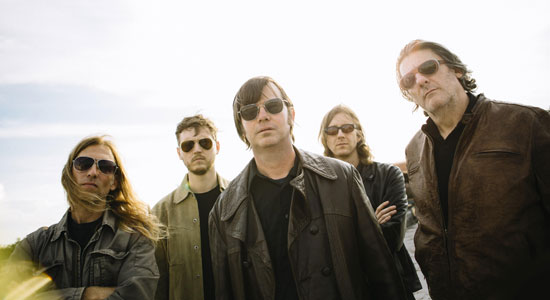
Son Volt’s Jay Farrar gets back to the dirty business of rocking out
For the sake of simplicity, you could say that 2013’s Honky Tonk was Son Volt’s “country” album, and the group’s latest is its “blues” album. Reality is rarely that cut and dried, however. So it’s probably best to say that the new Notes Of Blue (Thirty Tigers) toys with the achy bluster of ’90s Son Volt—though within an intermittent blues framework. “Overall, the end result winds up being more of an exploration of how various styles intersect with the blues,” says Jay Farrar of the band’s eighth studio release.
Twenty-two years ago, Son Volt kicked off Farrar’s post-Uncle Tupelo run with a definitive bang. Equal to or greater than anything his former group could muster, Trace has been a tough act to follow—and it doesn’t help that the album sounds as wrenchingly relevant now as it did in 1995.
As if to simultaneously acknowledge and contain Trace’s considerable shadow, Farrar embarked on a series of subdued shows in 2015 to promote an expanded 20th-anniversary reissue. This was not the Son Volt of old. “It was a good opportunity to reassess those songs and present them in a different way,” says Farrar of his last tour.
Self-produced with help from the revered John Agnello, Notes Of Blue actually benefits from some bait-and-switch tactics. After opening with a pair of tunes—“Promise The World” and “Back Against The Wall”—that wouldn’t have sounded out of place on Trace, Farrar abruptly puts on his blues big-boy pants for a series of songs that are as much a departure from the SV formula as you’re likely to hear. On “Cherokee Street,” “Midnight” and the skull-rattling “Static” and “Lost Souls,” Farrar’s sheer determination to work within the limitations of the idiom—the alternate tunings; the simple, succinct lyrics addressing sin, struggle, escape and redemption—actually frees him up to explore new instrumental textures and vocal approaches. Nothing dramatic, mind you—just enough to signal growth and evolution for a guy who just turned 50.
To keep things honest, Farrar adhered to the tunings of Mississippi Fred McDowell and Skip James, even cribbing lyrical snippets from old blues numbers as starting points. For further inspiration, he turned to the ragged rural beauty witnessed in the field recordings of music historian George Mitchell (think R.L. Burnside). “The guys at Fat Possum gave me that box set years ago,” says Farrar. “It’s that cross-pollination over centuries that sparks such creativity in music.”
On Notes Of Blue, it all comes together with ferocious perfection on “Sinking Down,” courtesy of Farrar’s darkly orchestral slide guitar and a relief valve of a bridge that emerges with all the beauty of an unexpected vista on a long, unrelenting drive through our country’s Trump-crazed midsection. “After doing those acoustic Trace shows, I definitely wanted to get back to playing some electric guitar,” says Farrar. “I even brought out the Webster Chicago amp used in the photograph for Trace, and this is also the first time I’ve played lead since Trace. So there’s a thread of continuity there.”
—Hobart Rowland






